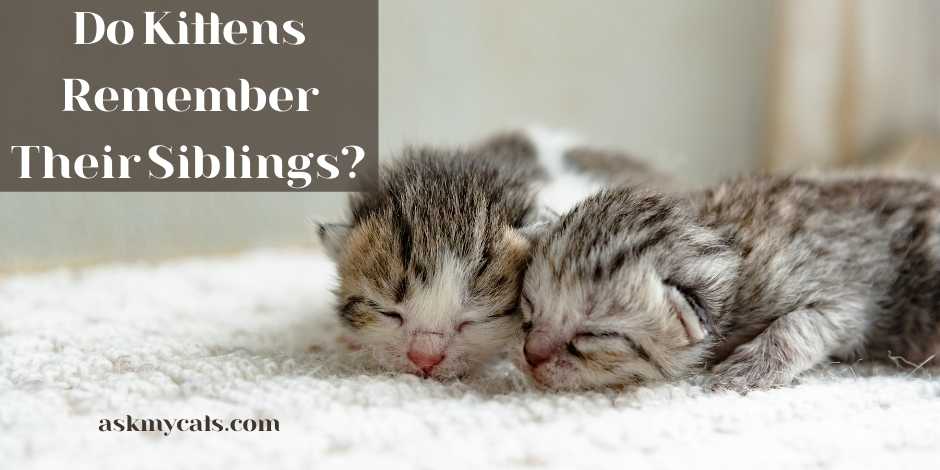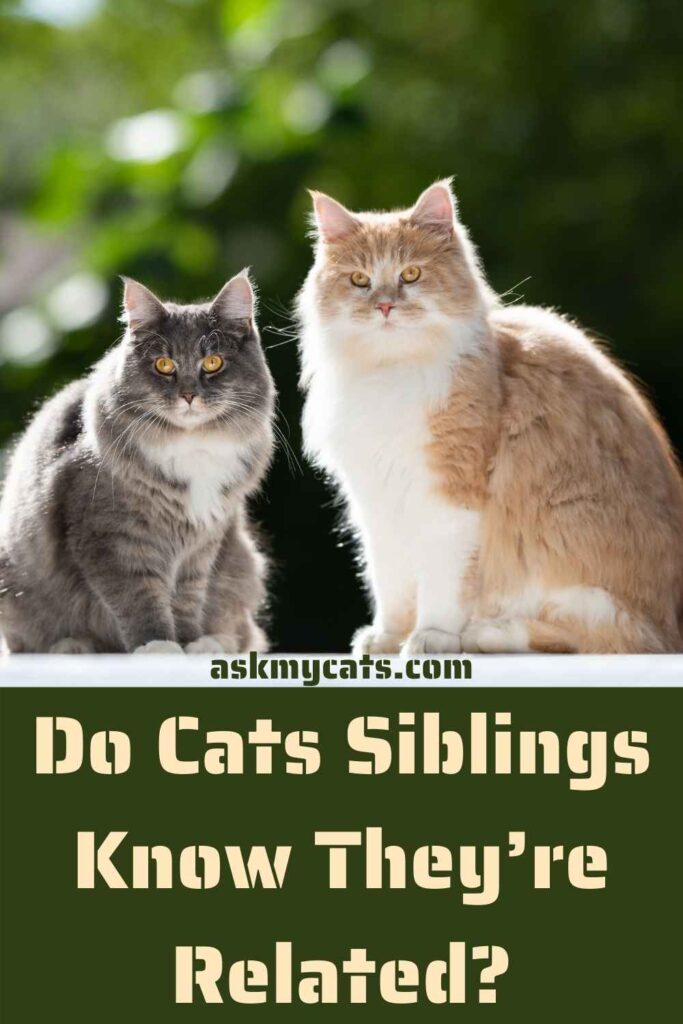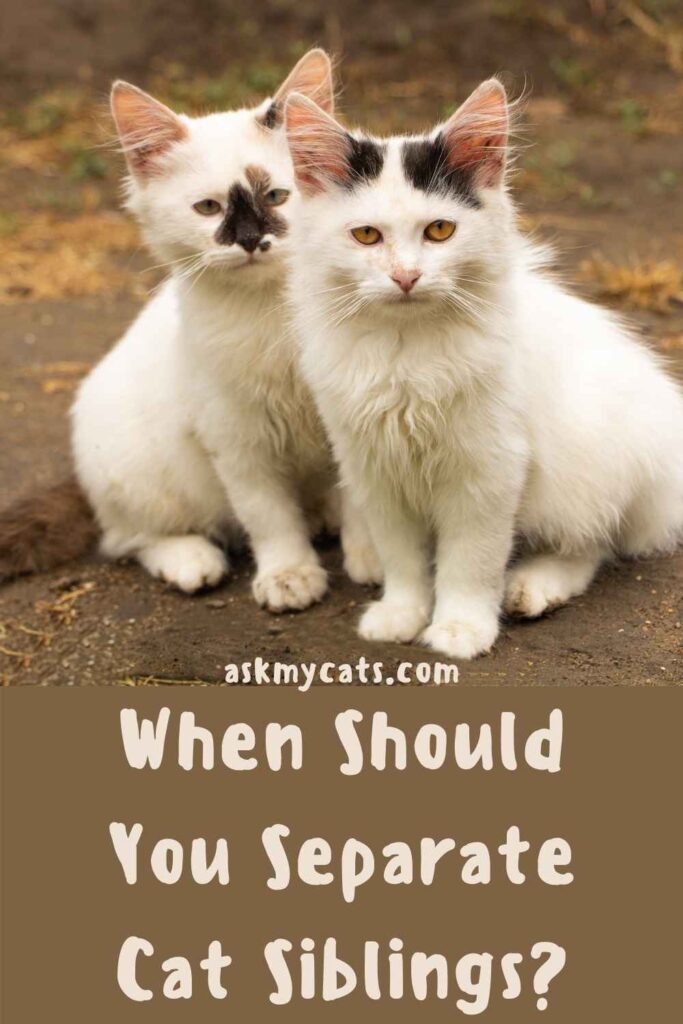While some cats love the company of other cats, cats are not packed animals like dogs.
After being split, kitten siblings are unable to remember or understand each other because they were raised together.
Even a brief break may be enough to cause them to forget.
Sibling cats that have been bred together and not separated apart clearly remember each other. If the cats are split for an extended amount of time, they will forget about each other.


Give Your Cat the Perfect Day
Get the Free Ebook!
Can Cats Remember Their Siblings?
If cats were separated particularly as kittens, cats from the same litter will have a similar odor and will react more favorably to a previous littermate than to a cat they’ve never seen.
It’s difficult to determine. Much depends on where and about how long they were apart.
This isn’t a guarantee; in many instances, reunited siblings who were split as kittens won’t recognize each other and would act as though they were confronted with an unfamiliar cat.
Cats from the same litter that was adopted and raised together would have developed a greater level of familiarity and social connections.
If these cats are separated, one or both of them can pine and show discomfort as a result of their sibling’s absence. However, it’s unknown if this has anything to do with their family links.
I’ve seen cats pining for an unrelated pet with which they’d formed a bond: calling for the lost buddy, wandering the home, and engaging in odd destructive behavior.
When the missing “family member” turned out to be a tiny Javanese terrier, the same answer was given. They can recall anything, but whether or not it is exactly siblinghood is debatable.
Cats, as previously said, seem to be very adept at recognizing their favorite people, even after a long absence.
Although feline intelligence isn’t well known, studies and anecdotal data indicate that cats may recognize different people even though they’ve been apart for a long time.
It’s debatable whether the cat is genuinely recognizing a person after some time apart or merely reacting favorably to the human’s polite overtures.
I tend to agree with the latter; I’ve seen aloof cats become positively effusive when reunited with a favorite human caregiver following a period of separation.
It’s just a hypothesis, but I believe that memory restoration is a survival instinct.
Do Cats Siblings Know They’re Related?
Since cats have large litters, kittens have several brothers and sisters. Their mothers also devote a lot of time to their kittens. As a result, linked cats spend a lot of time together.
Based on their smell, cats can tell if they’re linked. Mothers approach their kittens differently from most cats’ kittens and siblings get along swimmingly even as adults. Adopting littermates is a smart choice in this case. When the cats are apart, though, they forget about each other.

Cats are lonely animals that like to be alone. So, just because they know they’re connected doesn’t mean they’ll ‘heart’ each other. It’s still questionable if similar cats know each other after they’ve been removed.
Cats are aware of their kinship. As previously mentioned, cats can scent their father and mum, as well as siblings.
That’s why, even though adult cats aren’t packed animals, they can live in a group with their siblings and mother when they’re young.
Unfortunately, if these cats haven’t seen each other in a long time, they can forget who they are. That’s because each cat would have a totally different scent than before.
And if cats are aware of their kinship, this does not imply that they comprehend relatives in the same manner that humans do. A cat would not treat its family any differently from most cats until they reach adulthood.
It’s evolutionary in nature for cats to remember their family when they’re young. If the queen (mother cat) knows and cares about her offspring, she will take better care of them. If the kittens know their mum, they will stay with her.
When a cat reaches adulthood, he or she will treat all other cats equally, regardless of whether they are related or not. If the other cat is a stranger or a relative, a cat would be protective of its territory and food.
When both of the siblings live with their mum, they’ll all have the same odor. They have the scent of their mother and the world in which they live.
If a non-related cat of the same appearance wandered in, the others would instinctively identify it as a stranger. It wouldn’t smell like the group’s mother or their surroundings, for example.
It is evolutionarily beneficial for classes of siblings to know each other. They guarantee that the group’s mutual genetics are passed on to the next generation by avoiding newcomers.
Accepting a stranger’s cat would mean passing on the stranger’s genetics to the next generation. It is in the parents’ and siblings’ best interests to guarantee their own safety rather than that of foreigners.
When they grow up to be adult cats, however, the twins do not know each other. They may behave as if they’re enemies, battling for food or room as any two cats would.
Do Cats Treat Siblings Differently?
When they’re kittens, cats treat siblings differently from most cats. They are at ease with each other’s company.
They play together, groom each other, eat together, and live in close proximity to one another. If a new cat joined the squad, they wouldn’t approach it like this because it didn’t have a recognizable scent.
It’s possible that the siblings will remain together as they get older. They will also groom and play with each other. This is in stark contrast to what happens when two adult cats meet for the first time. Strangers are prone to rejecting each other.
Domesticated cats do not live in prides like lions. House cats, both male and female, are loners with their own territory. And siblings may have quarrels with one another.
And if siblings are apart, there is no proof that they remember each other. According to Behaviour, cats that are related mate less often than cats that aren’t.
The research team focused on wild cats. Female feral cats mate with several males, but when they’re in heat, they don’t welcome any male who approaches them. The researchers watched a group of female cats during estrous to see who they mated with.
Female cats will usually refuse to mate with any males who were similar to them, according to the report. This may mean that the pair would scent something about each other, indicating that they will not make a good mating couple.
To add to the confusion, it appears that siblings will mate with each other.
You might be interested to read about do cats mate with their siblings
Will Cats Remember Siblings After Being Separated?
There are some disadvantages of using scent to identify other cats. It’s possible that if you split one of the siblings from the others for a bit, it wouldn’t smell the same.
Others (including the mother) can deny it in that case.
This, though, is impossible to occur. This is due to the fact that kittens are barely isolated from their siblings. For the first few months of their life, the mother can have a close eye on her kittens.
The kittens will start to wander out on their own until they are old enough to smell, sound, and see the world around them properly.
It is not normal practice to separate kittens for sale until they are old enough to be weaned. Only after they’ve been thoroughly weaned and have had ample opportunity to explore the world around them are they split.
The siblings are no longer required to remember each other after this point.
When Should You Separate Cat Siblings?
You can separate cat siblings after they learn to socialize with the outer world.

It’s a widespread myth that kittens can be separated after they’ve been weaned. The time after complete weaning is equally significant. Kittens first learn to socialize with other cats during this time.
During this time, cats learn to interact with their siblings and parents. Kittens learn by watching their mothers from weeks 7 to 14.
This is even why kittens learn to socialize with adults, according to the journal Animals.
They observe their mothers’ play and imitate it. They observe their mothers’ grooming and imitate it for themselves and each other.
A kitten’s social growth would be stunted if it was separated from its siblings during this period. As a result, after 14 weeks, it is advised.
Things and their pets are given personalities, beliefs, and emotions by humans. Anthropomorphism is the term for this. You might believe that cats, like humans, have a sense of kin. They, though, may not.
While kittens spend most of their formative years with their siblings, forming strong bonds in the process, these bonds do not last.
Cats use their noses to recognize members of their species, unlike humans who only know loved ones by sight.
Putting stray cats together, even though they are from the same litter, is a terrible move and can result in violence.
Do Cats Miss Their Siblings?
Kittens that split during their first weeks of life will forget about each other. Since being moved into a new family, young kittens frequently miss their mother and siblings and exhibit symptoms of separation anxiety.

However, they quickly adjust to their new surroundings and re-establish contact with their new families.
After that, they typically forget about their mother, brothers, and sisters and embrace their new family.
This is due to the fact that cats know each other by touch, and a cat that smells different is considered a stranger.
When two litter-mates have been apart for a long time, they grow entirely different smells and behave as though they’ve never met before when reunited.
Their partnership develops as it does with any other cat from here on out. They can get along well, not so well, or just avoid each other politely.
Kittens that grow up together may or may not be friends. During the first few weeks of life, kittens often form close bonds.
Some sibling pairs maintain their relationship well into adulthood, while others, unfortunately, do not. It’s almost impossible to tell whether a litter-mate pair would grow up to be mates.
Do Cats Get Jealous Of Their Siblings?
Cats may be jealous of their siblings or not, and this phenomenon usually happens with one cat becoming more dominant in the case of two cats.
This is amplified if, as the theoretically more superior species in their lives, we teach or demonstrate that there is a justification to be jealous of our own actions.
Often, allowing them to rule us leads to a slew of problems with attitudes and mutual respect.
They pick up on our psychological abilities and shortcomings, much like girls, and defy or imitate them.
Do Cats Grieve For Their Siblings?
Yes. Cats grieve for their siblings. When a feline’s living relative passes away, it will dramatically alter her daily routine.
When the rest of the family is at work, she does not have someone to snuggle up with on the couch. She may be alone in her pursuit of the laser ball toy.
Cats have a sixth sense and can sense that things have shifted. If a cat is mourning the loss of a sibling, it would be clear. She could begin desperately searching for her missing partner.
She can totally forego food and treats. She may withdraw into herself or begin sleeping incessantly. Interest in personal hygiene can vanish completely.
Frequently Asked Questions
How long do kittens remember their siblings?
This usually takes between 12–13 weeks. It also helps whether they are accepted into a home with a kitten-loving cat or if they are adopted with a sibling.
Do cats get sad when separated from siblings?
Without a doubt! Cats live in a different way than humans; they are territorial, and the litter will eventually split from the mother and each other. Cats have normally ripped from their mother and siblings’ warmth, protection, and affection even earlier, as they are given away by their humans, usually at the age of 4-8 weeks.
Do cats get depressed when they lose a sibling?
Time cures all wounds, even if the cat is exhibiting other symptoms of depression (lack of appetite, changes in sleeping patterns, increased vocalization, over-grooming, pacing, and searching), these usually fade within a few weeks, but it can take up to six months.
Final Words
The scent is the primary means by which cats recognize each other. If one cat smells weird to another, regardless of whether the two cats are associated, the strange-smelling cat would be treated as a stranger.
This is why even two cats who have been together their whole lives will behave as though they’ve never met.
Even a brief walk to another place, such as the veterinarian’s office, will coat a cat with foreign scents, causing other cats in the house to see her as an intruder when you get her home.
